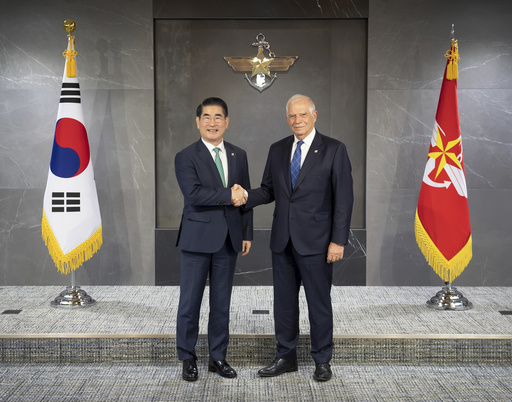
SEOUL, South Korea — High-ranking officials from South Korea and the European Union convened on Monday to express strong disapproval regarding North Korea’s reported deployment of troops to support Russia’s military actions in Ukraine. Both parties highlighted a commitment to collaborative efforts aimed at curbing the burgeoning military ties between Moscow and Pyongyang.
The potential mobilization of North Korean troops adds a troubling dimension to the protracted conflict in Ukraine, which has now been ongoing for nearly three years. In South Korea, concerns are mounting over the possibility of Russia reciprocating by supplying North Korea with advanced weapons technologies or promising military support should conflict arise on the Korean Peninsula.
During discussions held in Seoul, South Korean Defense Minister Kim Yong Hyun and Josep Borrell, the EU’s chief diplomat, voiced “serious concerns” regarding the situation and collectively denounced North Korea’s troop movements, according to an official statement from the South Korean Defense Ministry.
The two officials reached a consensus on the need to coordinate with the broader international community to inhibit the increasing military alignment between Russia and North Korea as noted in their statement.
Reports from the U.S. government suggested that approximately 8,000 North Korean soldiers have been stationed in close proximity to Ukraine and are poised to involve themselves in the conflict. In response, Ukrainian President Volodymyr Zelenskyy has called upon allies to take immediate action rather than merely observe, emphasizing the urgency of mitigating the impact of North Korean soldiers potentially entering the battlefield.
Intelligence assessments from the U.S., South Korea, and Ukraine indicate that North Korea might have relocated between 10,000 to 12,000 troops to Russia. Should these forces engage in combat against Ukrainian troops, it would signify North Korea’s first significant involvement in a conflict of this magnitude since the conclusion of the Korean War in the early 1950s.
North Korean leader Kim Jong Un is using the turmoil of the Russia-Ukraine war to solidify defense and economic partnerships with Russia, strategically countering the intensified pressure from the U.S. on his advancing nuclear initiatives. The accusations from the U.S., South Korea, and others claim that North Korea has already supplied Russia with artillery shells and various conventional weapons.
In recent years, Kim has escalated missile testing, including the deployment of nuclear-capable systems, while Russia and China have consistently obstructed U.S. attempts to impose stricter international sanctions on North Korea in response to these activities, which violate multiple U.N. prohibitions. Furthermore, North Korea appears to be moving away from its long-term goal of reconciliation with South Korea, opting instead for hostility.
In a background briefing for local media, South Korea’s military highlighted that North Korea has constructed anti-tank, trench-like structures at two locations near the heavily fortified border between the two Koreas. This follows the North’s demolition of specific portions of unused cross-border transportation routes last month, which has been interpreted as a show of resentment toward South Korea. The eastern trench measures roughly 160 meters (524 feet) while its counterpart on the western side is about 120 meters (393 feet) long.
In the event of a military conflict, South Korean military officials indicated that these trenches could be swiftly filled with dirt to create possible pathways for invasion. Recent commercial satellite imagery suggests that this trench construction commenced shortly after North Korea’s orchestrated demolitions of a road and rail section along the borders on October 15.
Last week, North Korea also conducted a test launch of an intercontinental ballistic missile aimed at striking the U.S. mainland, marking the first such activity in nearly a year.
